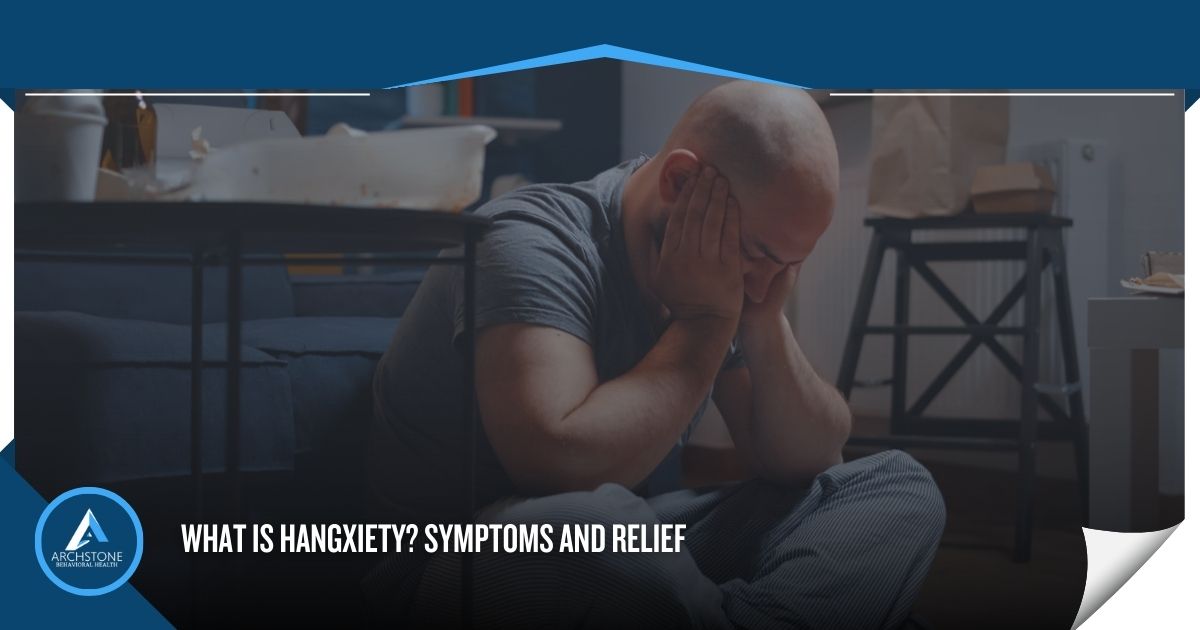What is Hangxiety? Symptoms and Relief
Get Help Now
Alcohol can impact your body and mind in different ways. While drinking, you may experience pleasurable effects, like relaxation and increased social confidence. Drinking excessively could lead to nausea, loss of coordination, and dizziness.
Alcohol’s effects can carry over into the following day, as well. A hangover can be an unpleasant wake-up call after a night of drinking. Hangovers can come with nausea, dizziness, and other physical symptoms. But they can also cause unexpected psychological symptoms, including anxiety.
Some people call this “hangxiety.” Hangxiety can be an uncomfortable and confusing symptom of a hangover. So, why does it happen–and what can you do about it?
This article will explore hangxiety. You will learn:
- The symptoms of hangxiety
- What causes anxiety after drinking
- How to get rid of hangxiety
- The signs of alcohol addiction
- Where to find alcohol abuse treatment and support
Contact the Archstone Behavioral Health team now to learn about our comprehensive treatment programs or to find support at any stage of your recovery.
What is Hangxiety?
Hangxiety is a term that combines the words “hangover” and “anxiety.” People may develop hangxiety alongside other hangover symptoms, including nausea, sweating, and tremors. Mental health experts believe people may be more likely to develop hangxiety if they feel guilty or anxious about their drinking.[1]
What are the Symptoms of Hangxiety?
Hangxiety can occur as part of a hangover. People may experience hangover symptoms after drinking heavily.
Some common symptoms of hangxiety include:
- A sense of impending doom or that things will never be OK
- Excessive worry
- Paranoia
- Increased heart rate
- Sweating
- Poor concentration and focus
- Restlessness
- Feeling irritable
- Shame or guilt about your behaviors while intoxicated
Anxiety can be distressing and may impair your functioning.[2] Understanding and addressing the causes of hangxiety can help you avoid it in the future.
What Causes Hangxiety?
Mental health experts have only recently begun using the term “hangxiety” to describe the anxiety that can accompany a hangover. Some mental health and addiction specialists believe hangxiety may be a complex issue with many possible causes.
Here are some of the things that may cause hangxiety after drinking alcohol.
Social anxiety
Some people use alcohol to boost their social confidence or feel more relaxed with others. As the effects of alcohol wear off, people may experience anxiety. Additional hangover symptoms can cause increased feelings of stress and discomfort.
Detoxification
When you stop drinking after a period of heavy alcohol consumption, your body begins to detoxify. You may experience a range of withdrawal symptoms. You might feel restless, nauseated, and sweaty as your body detoxifies. Post-drinking anxiety may be a symptom of withdrawal.[3]
Poor sleep
Alcohol disrupts your sleep cycles and prevents you from getting good quality sleep. You may experience hangxiety if you are sleep-deprived after a night of drinking.
Dehydration
Alcoholic drinks are not hydrating. In fact, alcohol’s diuretic effects mean you may actually lose more water than you take in. If you don’t replace this lost hydration, your body can become dehydrated. Anxiety is one possible symptom of dehydration.
Folic acid deficiency
Proper nutrition can keep your body’s nutrients balanced. Poor diet and excessive alcohol intake can deplete your body of essential nutrients like folic acid. Folic acid deficiency may lead to increased anxiety and other mood changes.[4]
Guilt or shame
Alcohol can lower your inhibitions. When you drink, you may do or say things that you wouldn’t do if you were sober. You may experience anxiety if you feel guilty or ashamed of your behaviors while intoxicated.
Hangxiety Relief
If you have ever experienced hangxiety, you know that it does not feel good. Fortunately, there are steps you can take to feel relief and prevent hangxiety in the future.
Here are some things you can do to deal with hangxiety:
- Practice good self-care. Stay hydrated, prioritize sleep, and eat a balanced diet that includes regular meals.
- Practice mindfulness when you feel anxious. Deep breathing, meditation, and other grounding practices can help you soothe anxiety after drinking.
- Write down or talk about how you are feeling. Keep a journal or call a supportive friend to discuss what is worrying you.
Hangxiety can make you miserable. If you experience anxiety after drinking but cannot stop, you may need professional help to safely quit drinking and avoid relapse.
Recognizing Alcohol Addiction
Drinking alcohol is common and widely accepted in our culture. With all the opportunities to consume alcohol in everyday life, it can be easy to slip into a destructive pattern of drinking.
Here are some signs that you may need help to address alcohol addiction:
- You regularly drink more than you planned
- You have to drink more to get “buzzed,” or you can drink a lot without appearing intoxicated
- You do dangerous things while drinking, such as having risky sex or driving
- When you stop drinking, you experience withdrawal symptoms
- You continue to drink even though it causes health, social, or financial problems
Find Help Now
Alcohol addiction can become life-threatening if you do not seek help. Reach out to the Archstone Behavioral Health specialists to learn about our holistic alcohol rehab programs or to find support at any stage of your recovery.
References:
- National Institutes of Health (NIH): Depression, Anxiety, and Stress among Hangover-Sensitive and Hangover-Resistant Drinkers
- National Institutes of Health (NIH): Anxiety
- National Institutes of Health (NIH): The impact of alcohol hangover symptoms on cognitive and physical functioning, and mood
- Science Direct: The neurology of folic acid deficiency
